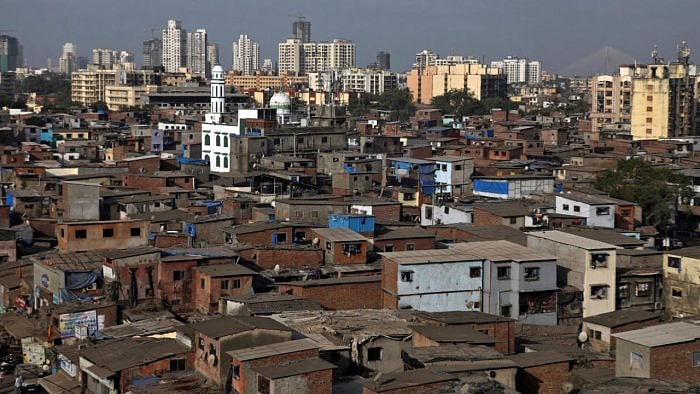
Mumbai's Dharavi slums.
Credit: Reuters File Photo
‘There is no need for (people’s) consent.’
It’s ironic that this statement was made on record by a senior bureaucrat of a state that came into being as the result of a people’s movement, in which 106 persons sacrificed their lives. Yet today, ‘there is no need for people’s consent’ seems to be the motto that guides Maharashtra’s model of governance.
S V R Srinivas, the CEO of the Dharavi Redevelopment Project (DRP), gave the above statement as a reply when asked if all Dharavi residents had given their consent to the DRP. The Maharashtra government has made the Adani Group the executor of its grandiose plan to transform Asia’s second-largest slum into a modern township. By law, any slum redevelopment project in Mumbai can only proceed if 50% of the residents agree on the builder. But Srinivas said, “…here, the government has appointed the developer. In this case, there is no need for consent.”
Implicit in this statement is the premise that the government knows best. That’s also the premise behind Maharashtra Chief Minister Devendra Fadnavis’ determination to transform Gadchiroli district, known as a Maoist hub, to a ‘steel hub’.
Gadchiroli’s Adivasi inhabitants live off its forests, and seem to be making a good living too: in 2017, they earned Rs 8-10,000 a month selling tendu and bamboo leaves; in 2020, the government announced a bonus of Rs 10.62 crore for tendu collectors.
The Adivasis have had little use for the mineral resources that lie under these forests. On the contrary, they’ve been protesting continuously against the mining permission granted in 2006 to Lloyds Metals and Energy Ltd.
But does that matter to the government? Hardly.
Transforming Gadchiroli into a ‘steel hub’ has long been Fadnavis’ obsession, right from his first term. Now, in his second term, the chief minister has gone full steam ahead on achieving it.
Barely six weeks after being sworn in on December 5, Fadnavis appointed himself Guardian Minister of Gadchiroli District – the first time a Maharashtra chief minister chose to be guardian minister of a district.
In February, came the announcement of the world's largest steel plant.
In March, he met the prime minister to push his vision, and in April, set up a Gadchiroli District Mining Authority.
In May, the Centre allowed the cutting of over 100,000 trees to facilitate Llyod’s iron ore processing plant. The latest push came on June 9 – approval for Lloyds to more than double its production - even as petitions against the company are pending.
Fadnavis is also the first chief minister to have visited the last village on Gadchiroli’s border with Chhattisgarh. The village lies on the foothills of Abujmarh, considered an impregnable Maoist citadel until the Centre’s ‘Operation Kagar’. Fadnavis declared North Gadchiroli ‘Naxal-free’ in January, and is confident that South Gadchiroli would soon achieve that status. “Police dominance has been established,’’ he boasted recently.
What about tribal dominance? Gadchiroli’s tribals have been protesting from the time Llyod began operations under a Congress ‘double engine’ regime. The tribals allege that no consent was taken from gram sabhas as is mandatory under the Constitution.
Mandatory public hearings were held only in name, far from the affected villages, with villagers often not being allowed to attend.
But even the minutes of these faulty hearings show that the destruction of their fields and rivers by polluted red water and mining dust was a concern.
In 2023, Lloyds Metals pleaded guilty to having violated the Environment Protection Act by carrying on operations without getting fresh environmental clearance, in a litigation initiated against it by the Maharashtra Pollution Control Board. Yet, it has been allowed to expand operations.
The benevolence shown to the mining firm has not been shown to those directly affected by mining. Instead, many of those who have protested have been labelled ‘Maoists’ and jailed.
While the Maoists did shoot dead the vice-president and a sub-contractor of Lloyds Metals in 2013, and made it tough for the company to function, it was the villagers who torched the company’s trucks in 2019, angry at the fatal accidents involving these vehicles.
The last two years, however, have been marked by peaceful protests, often led by elected tribals who fought local body elections in the face of opposition by the Maoists.
Both the bureaucrat who said that consent was not required, and Maharashtra’s chief minister, have long been part of a democratic system. Strangely, they can dispense with people's consent.
Jyoti Punwani is a senior journalist.
Disclaimer: The views expressed above are the author's own. They do not necessarily reflect the views of DH.